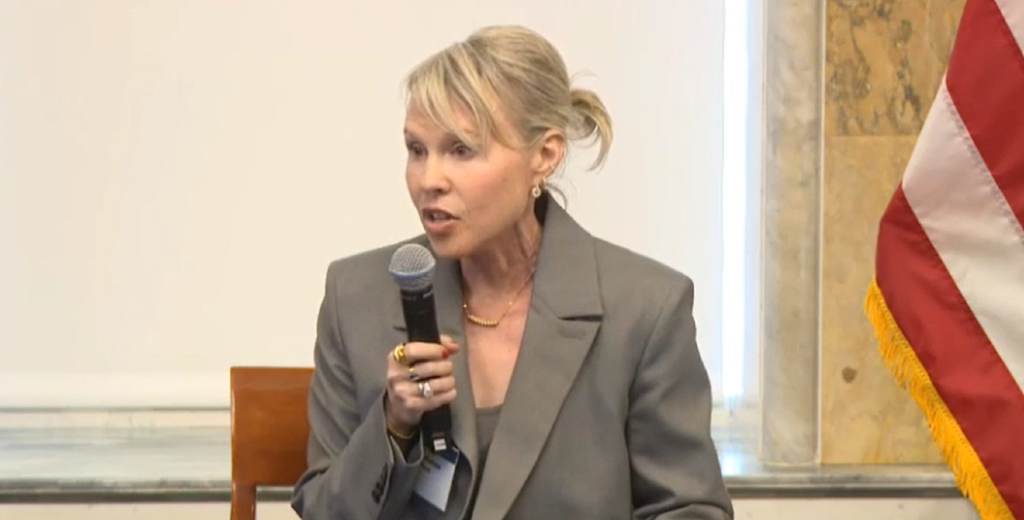
AI
Experts argue that AI introduces new economic risk while others claim it increases firm capabilities.
 Screenshot of Samara Cohen, Chief Investment Officer at BlackRock, at the U.S. Department of the Treasury on Thursday
Screenshot of Samara Cohen, Chief Investment Officer at BlackRock, at the U.S. Department of the Treasury on Thursday
June 11, 2024 – Experts disagree on the use of artificial intelligence in the financial sector, as discussed during the 2024 Conference on Artificial Intelligence & Financial Stability at the U.S. Department of the Treasury.
Hilary Allen, professor of law at American University noted that AI’s lack of true intelligence and reliance on data are fundamental concerns. “A lot of people get confused by the term AI because you hear the term intelligence…But in fact, it’s not intelligent in the way that a human is intelligent,” she said, adding that it is “basically applied statistics.”
Allen stressed the new operational risks and the importance of understanding the concentration risks of relying on third-party vendors and cloud providers. She explained that this understanding is critical to preventing future financial crises, such as data poisoning by cyber attackers, because corrupt data can disrupt an algorithm’s function.
“In particular, if we’re just thinking about this as being data and statistics, and we know this from before 2008, that rare events are typically ignored,” she said, referring to the period before the 2008 global financial crisis. “They’re typically ignored by humans. And they are even more going to be ignored by artificial intelligence.”
She explained that creating portfolios using similar algorithms and data can exacerbate herd behavior. This intensifies market downturns because similar algorithms react to the same data in the same way, leading to amplified market movements and potential crashes.
“Herd behavior is very dangerous when things go badly,” she noted. “If everybody is relying on the same kind of data and using the same few algorithms, everyone is going to be acting in lockstep.”
Chief Investment Officer of ETFs and Index Investments at BlackRock Samara Cohen instead highlighted the benefits of AI in financial operations and its broader positive impact on market modernization.
Cohen explained that BlackRock grew to become the world’s largest fiduciary through AI’s long-standing use in trading and portfolio management, specifically in how it looks at data and access markets. She expressed that AI has revolutionized trading and portfolio management at their firm, transforming how data is analyzed and markets are accessed.
“We have to trade large index rebalances every time the composition of an index changes. One of the biggest unlocks in our being able to do that effectively for our clients is applying machine learning to predict volumes on rebalance days, price behavior of ads or deletes from the indexes, and use that information to inform our trading strategy,” Cohen elaborated.
Although she also expressed that technology and AI should be regularly monitored, Cohen suggested that the broad use of technology has helped markets modernize. She asserted that AI’s benefits extend beyond individual firms, contributing to market modernization and transparency.
“The use of algorithmic trading and really the spectrum of AI applications in markets are helping people participate specifically in fixed income markets at a point that it is more critical than ever before in portfolio construction,” she said. “All of this, of course, is predicated on best practices and on risk management… to the extent that they work, absolutely roll up and have systemic benefits.”
Every year, under the Dodd-Frank Wall Street Reform and Consumer Protection Act, the Financial Stability Oversight Council presents an annual report to Congress outlining the council’s views on vulnerabilities in the financial system and recommendations to address them.
The act aims to promote the financial stability of the United States through enhanced transparency and accountability in the financial system and to protect American taxpayers from abusive financial services practices, among other purposes.
The increasing use of AI in financial services was identified as a vulnerability in the financial system for the first time in the Federal Stability Oversight Council annual report 2023. The council recommends that financial institutions, market participants, and regulatory and supervisory authorities deepen their expertise and build capacity to monitor AI innovation and usage to address emerging risks effectively.
A Department of Treasury report released in March focuses on the current state of artificial intelligence cybersecurity and highlights key steps to address immediate AI-related operational risk, cybersecurity, and fraud challenges. The report also emphasizes ways to address these challenges as the council remains in regular communication with federal financial regulators regarding their AI-related efforts.

